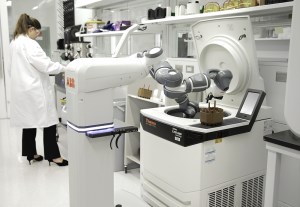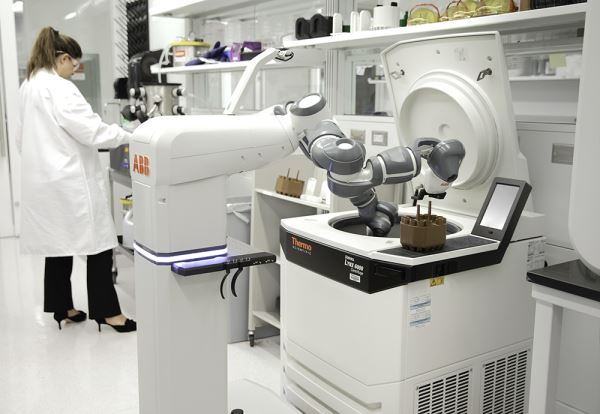ABB has opened its first global healthcare research hub at the Texas Medical Center (TMC) campus, in Houston, Texas.
The research hub has been developed to create a Hospital of the Future, with ABB showcasing a number of concept technologies.
This includes its mobile YuMi robot, which is being designed to assist medical and laboratory staff with laboratory and logistics tasks in hospitals.
The dual-arm mobile YuMi will be able to sense and navigate its way around its human co-workers autonomously, while learning to find different routes from one location to another. It has the potential to undertake a wide range of repetitive and time-consuming activities, including preparation of medicines, loading and unloading centrifuges, pipetting and handling liquids and picking up and sorting test tubes.
The mobile YuMi could also be used in hospitals for a wide variety of logistics roles. It may be able to dispense medicines, transport them to where they are needed in hospitals, bring medical supplies to hospital staff and bed linen direct to patients’ bedrooms.
At TMC Innovation Institute, ABB is developing robots that can carry out repetitive, delicate and mundane processes, leaving highly skilled medical and laboratory staff free to undertake more valuable roles and ultimately treat more patients.
Robots can work 24 hours a day
ABB analysis shows that repetitive tasks could be completed up to 50 per cent faster with automation, compared to current manual processes, with the added benefit that robots can work 24 hours a day.
“The healthcare sector is undergoing significant transformation as the diagnosis and treatment of disease advances, while coping with an aging population, increasing costs and a growing worldwide shortage of medical staff,” said Sami Atiya, President of ABB’s Robotics and Discrete Automation business.
“With our new healthcare research and development hub at TMC we are aiming to develop answers to these challenges – together with the best minds in academia, science and medicine.”
Mr Atiya said ABB’s experience in industrial and collaborative robotics gives the company a strong basis to adapt flexible automation to the healthcare sector.
“Together with our partners at TMC, we will develop cutting-edge robotics solutions,” he said.
Mr Atiya says ABB is working to reduce the number of manual procedures performed by medical staff, improve the accuracy of laboratory work and enhance patient satisfaction and ultimately patient safety.
Other technologies on display at the Research Hub include YuMi robots that could aid in centrifuge tending and test tube handling systems, and an IRB 1200 robot that could execute liquid transfers in a pipetting application.
All are common medical laboratory tasks that robotic automation may be able to support by combining consistent performance with a level of flexibility and continuous operation that could increase throughput and quality while minimizing costs.
TMC is the largest medical city in the world with world-class collaborative research resources, including some of the world’s leading companies and hospitals.
The new 500 sqm Healthcare Hub will be housed at the TMC Innovation Institute, a state-of-the-art hub that fosters collaboration of medicine and cutting-edge technology. The hub connects start-ups with pioneers in academia and leading technology companies to accelerate the development and prototyping of breakthrough medical technology.
Shaping the future of healthcare
Bill McKeon, President & CEO of Texas Medical Center said ABB’s R&D facility at the campus will set a new course for advancements in medicine.
The partnership will shape the future of healthcare for clinicians, researchers, and patients, he said.
Robotic automation in the healthcare sector offers significant opportunity for future growth.
According to internal ABB research, the global market is estimated to reach nearly 60,000 non-surgical medical robots by 2025, a fourfold increase from 2018.
TMC is the largest medical city in the world and is at the forefront of advancing life sciences. It employs more than 106,000 people and hosts 10 million patients each year.
More than 180,000 surgeries are performed at the centre, including about 14,000 heart surgeries.
More than 25,000 babies are delivered at the centre annually.


